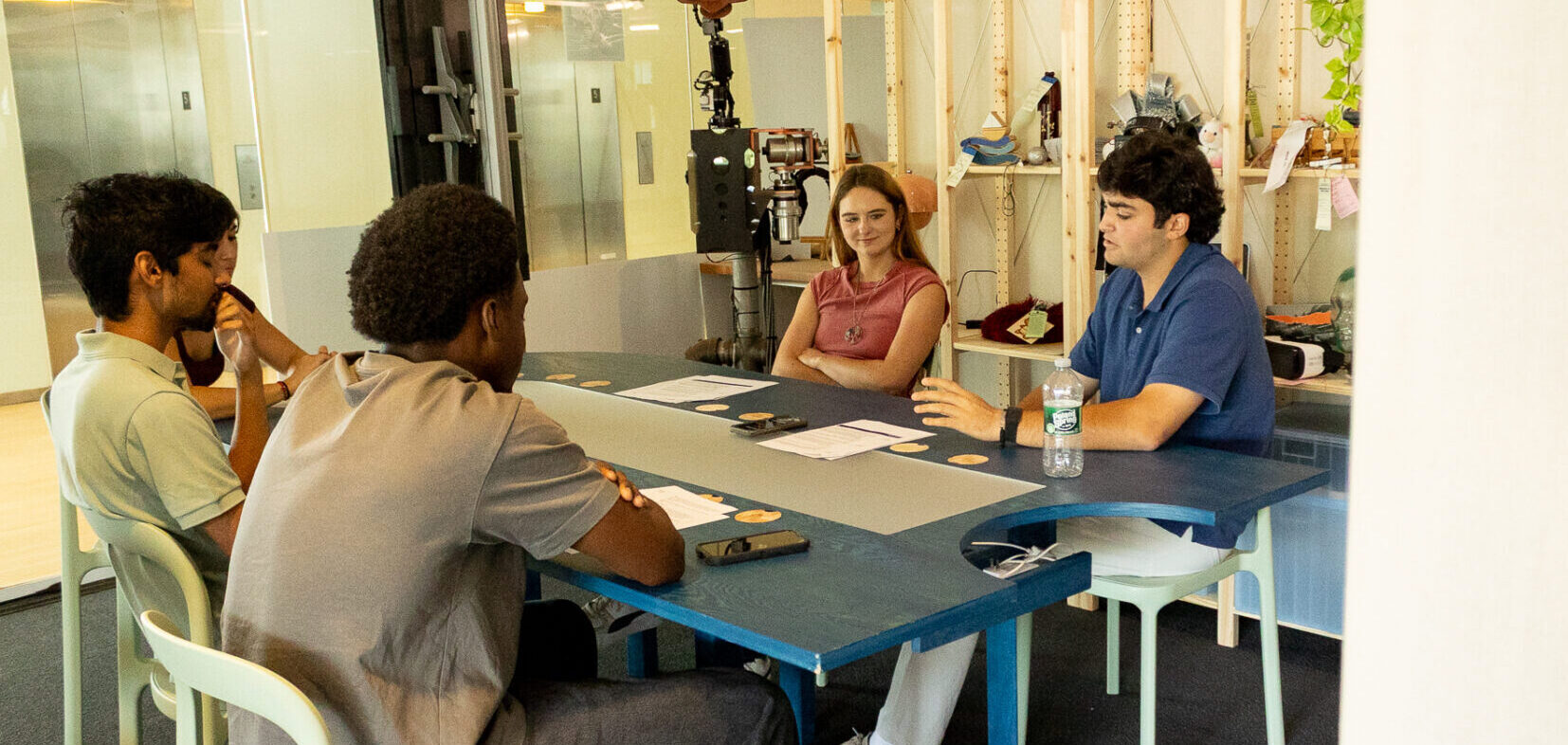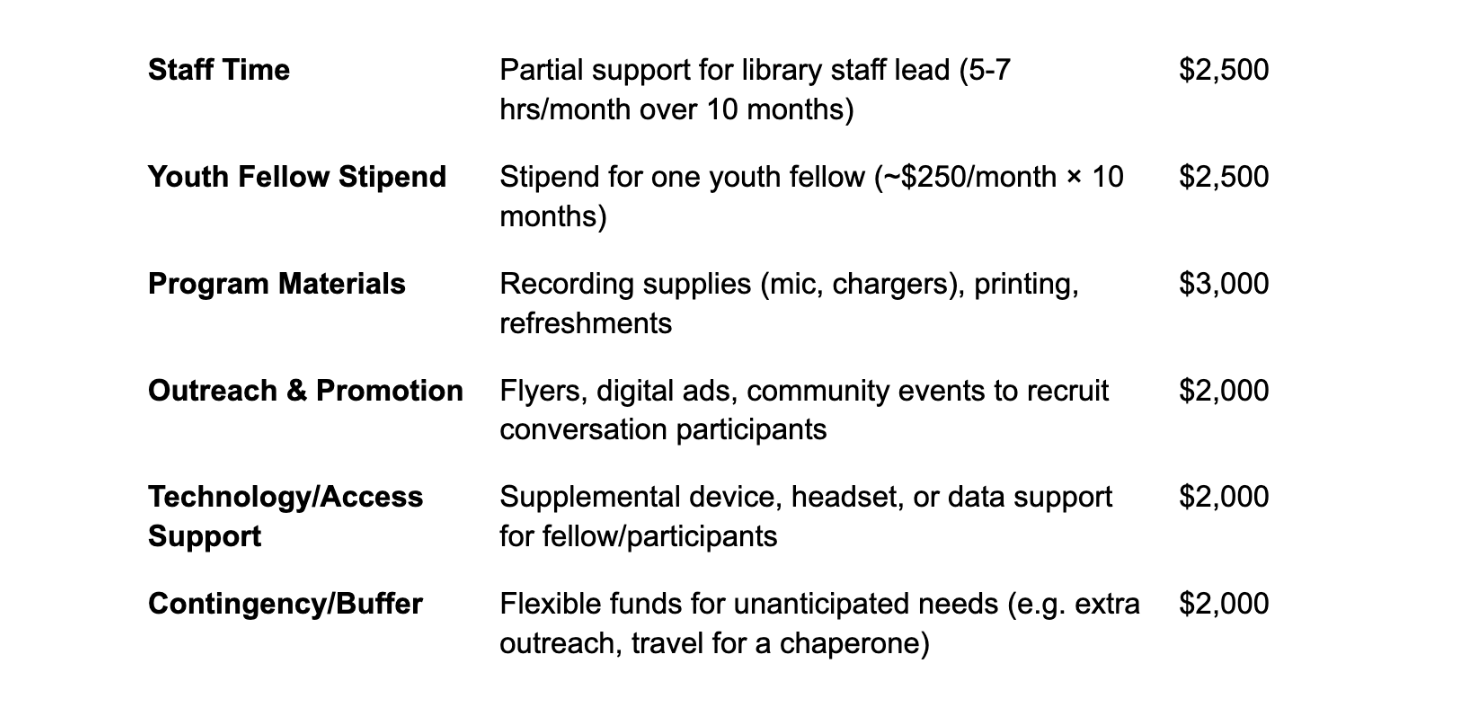
Application Logistics
We expect this application will take approximately 30 minutes to complete.
Yes. To access a PDF version of the application, click here.
Upon application submission, you will receive an email confirmation with next steps about interview scheduling and structure. Selected grantees will be directly notified by a member of the Cortico team on or before October 20, 2025.
No, there is not. The Teen Dialogue Accelerator is supported by The Carnegie Corporation, a private, philanthropic grantmaking foundation.
Selected grantees will be notified on a rolling basis on or before October 20, 2025.
The Basics
This program equips libraries with a scalable model for youth-led civic discussions and helps to empower teens to lead conversations in their communities, helping them raise their voices, build leadership skills, and contribute to a national story about issues they care about. With the support of Cortico, MIT, the American Library Association, and PBS FRONTLINE, library staff will gain tools, training, and resources to support and sustain impactful conversations both locally and nationally.
It’s a national initiative equipping public libraries and young people to co-design and lead small-group conversations with 4-6 teens in their community. Teens and library staff will use AI-assisted tools to make sense of these conversations and create voice-powered outputs like medleys and conversation maps.
It goes beyond “just talk.” Teens’ lived experiences are recorded, made sense of through deep listening, and then shared back as creative outputs like audio medleys and conversation maps. These stories have the opportunity to live on through local events, library programming, and national storytelling with PBS FRONTLINE.
Cortico runs this program in partnership with MIT’s Center for Constructive Communication and with ALA’s Public Programs Office in an advisory role. That said, youth fellows and library staff will lead the conversations themselves, supported by training, coaching, and technology. We hope to equip libraries to ultimately continue to run this program independently with continued access to Cortico’s tools and methodology.
Since Cortico’s founding, we’ve partnered with over 250 organizations to deliver a tech-enhanced conversation approach, empowering them to listen deeply to the voices in their community, make sense of them, and inspire more informed action.
With the support of The Carnegie Corporation, this accelerator equips libraries and young people with the training and technology to turn small-group conversations into actionable insight.
Any public libraries located in the U.S. and U.S. territories with the following characteristics are invited to apply:
10 public libraries nationwide will be selected to participate.
The Program
Applications open in September 2025, with a deadline of October 13 2025 at 11:59pm EST. Libraries apply by nominating a team including one staff member and one youth fellow to join the pilot. Teens will then recruit peers and co-design conversation guides.
Each participating library commits to nominating one staff lead and at least one youth fellow. Together, they’ll attend learning intensives (both virtually and one in-person at MIT’s campus in Cambridge, Massachusetts!), connect with the broader national cohort, design and launch a civic conversation project at their library, recruit youth conversation participants, and plan conversations.
The Learning Intensive Workshops are immersive trainings that launch the Teen Dialogue Accelerator, bringing together library staff and youth fellows from across the country. Teams will join two virtual workshops on November 6th and 13th (each from 2:00 – 5:00 pm EST/11:00 – 2:00pm PST) and one in-person workshop on January 27th at the MIT Media Lab in Cambridge (travel stipend provided). Together, participants will learn Cortico’s tools, co-design conversation guides, and build facilitation skills while connecting with a national cohort. These sessions will help to lay the foundation for leading youth-driven conversations locally and nationally.
The staff member and youth fellow will work as a team and be the primary participants in the pilot program. In addition to the virtual and in-person learning intensives, their estimated time commitment is below:
Library branches should apply individually even if they are part of the same library system.
Libraries will be chosen based on:
Projects should focus on civic themes like democracy, immigration, AI, the future of work, or other issues teens identify as important. Conversations are about lived experiences, not debates.
While this is the first national Teen Dialogue Accelerator, previous Cortico youth-led dialogues have focused on:
Each library receives $14,000 to support staff time, teen stipends or incentives, program materials, and outreach. Libraries are trusted to use the funds as they see fit throughout this program and will not need to report expenditures to Cortico or Carnegie. Travel expenses for the January intensive are covered through an additional $2,000 stipend, so libraries will not need to allocate their grant money towards travel.
As noted above, there are no budget reporting requirements and libraries are trusted to use the funds as they see fit. That said, please find a sample budget below to support libraries as they envision how this funding could support their work.

Yes. Young people and staff will co-create outputs such as audio medleys, conversation maps, and reflective portfolios using emergent skills, knowledge, and tools from Cortico-led workshops. These will be shared nationally through PBS FRONTLINE and libraries can also share these locally through library events if they choose.
The Technology
Participating libraries need access to only minimal technological resources. In-person conversations can be recorded using a phone (e.g., the Voice Memos app on an iPhone) or another basic recording device. Virtual conversations can be hosted and recorded via Zoom, and from that point the conversation audio can be directly uploaded to Cortico’s platform. While a computer is not strictly required to attend virtual sessions or complete sensemaking activities, having one is ideal.
Youth fellows and staff will learn to use Cortico’s platform to record, analyze, and make sense of conversations. Outputs like audio medleys and conversation maps will amplify youth voices in creative, accessible ways.
Yes. Cortico’s tools are human-steered and designed to be approachable. Full training, onboarding, and ongoing support will be provided.
All conversations are hosted with clear consent processes. Youth fellows and staff will be trained on best practices for safeguarding participant privacy, and outputs will only include content approved by participants. Libraries are expected to manage consent for conversation participants under the age of 18, who require permission from a parent or guardian to take part. Cortico regularly supports youth conversations and will provide a template consent form for utilization by libraries.For more information, you can also read our full data and privacy policy here.